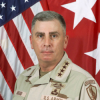John Abizaid

John Abizaid
John Philip Abizaidis a retired United States Army general and former U.S. Central Commandcommander, overseeing American military operations in a 27-country region, from the Horn of Africa, the Arabian Peninsula, to South and Central Asia, covering much of the Middle East. CENTCOM oversees 250,000 US troops. Abizaid succeeded General Tommy Franks as Commander, USCENTCOM, on July 7, 2003, and was also elevated to the rank of four-star general the same week. He was succeeded by Admiral William J. Fallon on...
NationalityAmerican
ProfessionSoldier
Date of Birth1 April 1951
CountryUnited States of America
I believe that there are elements of extra-legal militias that are moving around doing some of this damage. There may be people with misguided loyalties in some of the security services, although less in the army than in the police.
What I've asked for is essentially to have a strong mobile combat arms capability, ... That's probably about two brigades worth of combat power, if not more.
We certainly will take whatever military action we need to defend ourselves and to prevent the enemy from taking advantage there,
We have decided to make sure that we're cautious about how we're operating, and I have nothing to say further than that,
Boots per square inch is not the issue. You have to have solid intelligence in a conflict such as this, so you can get to the terrorists,
There is always a possibility that things could deteriorate,
Now, people will say, 'Well, that's a very small number,' but when you understand that they're organized in cellular structure, that they have a brutal and determined cadre, that they know how to operate covertly, they have access to a lot of money and a lot of ammunition, you'll understand how dangerous they are,
Militarily we are not in any danger of losing. We can't be defeated militarily based on what the enemy currently throws against us.
But I am satisfied that the information that we have that this is the work of Zarqawi, is accurate.
Our forces will not be on the sidelines.
I think you will see a lot of strains develop in the political process that will result in violence everywhere in the country - but it's controllable, it's workable and it will lead to a much better future for these people.
But all that having been said, you can't, in a city of a million people like Karbala, or 5 million like Baghdad, you can't be in all places at all times.
I think what actually works best is local-level individual targeting of key leadership nodes.
Being on the run, having to change the way that you do business, being unable to plan in a safe and secure environment, always looking over your shoulder, knowing that some day somebody's going to knock on your door and it's going to be your last.